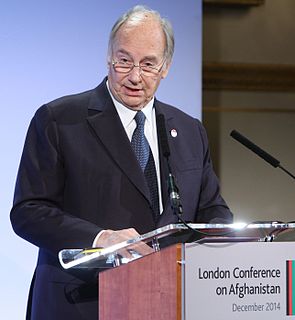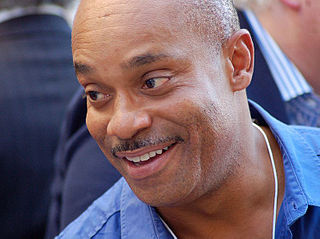A Quote by Aga Khan IV
Pluralist societies are not accidents of history. They are a product of enlightened education and continuous investment by governments and all of civil society in recognizing and celebrating the diversity of the world's peoples.
Related Quotes
Creating harmony amidst diversity is a fundamental issue of the twenty-first century. While celebrating the unique characteristics of different peoples and cultures, we have to create solidarity on the level of our common humanity, our common life. Without such solidarity, there will be no future for the human race. Diversity should not beget conflict in the world, but richness.
My country's history, Mr. President, tells us that it is possible to fashion unity while cherishing diversity, that common action is possible despite the variety of races, interests, and beliefs we see here in this chamber. Progress and peace and justice are attainable. So we say to all peoples and governments: Let us fashion together a new world order.
As to the origin of civil Societies or Governments; the Author of our Being, has given Man a Nature to be fitted for, and disposed to Society. It was not good for Man at first to be alone; his nature is social, having various Affections, Propensities and Passions, which respect Society, and cannot be indulged without a social Intercourse.
All over the world, independent and strong civil society - NGOs, faith leaders, and other community advocates - help governments solve problems and better serve their people better by shining a light on the issues that matter most - like education standards, access to healthcare, the rule of law, and economic opportunity.
Western societies from ancient Athens to imperial Rome to the French republic rarely collapsed because of a shortage of resources or because foreign enemies proved too numerous or formidable in arms - even when those enemies were grim Macedonians or Germans. Rather, in times of peace and prosperity there arose an unreal view of the world beyond their borders, one that was the product of insularity brought about by success, and an intellectual arrogance that for some can be the unfortunate byproduct of an enlightened society.
There's a long list of investments that governments could and should be making. There is strengthening infrastructure, such as transport and communications; there is investment in education; there is investment in families, particularly putting measures in place that free women from having to make the choice between raising a family and work.
The gap between ideals and actualities, between dreams and achievements, the gap that can spur strong men to increased exertions, but can break the spirit of others -- this gap is the most conspicuous, continuous land mark in American history. It is conspicuous and continuous not because Americans achieve little, but because they dream grandly. The gap is a standing reproach to Americans; but it marks them off as a special and singularly admirable community among the world's peoples.



































